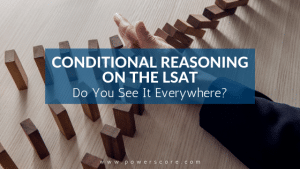Are you taking the LSAT in Brazil? Students take the LSAT if they plan to attend law schools in the US and Canada. However, the test administers across the globe. Check out this post about taking the LSAT abroad.In Brazil, only two locations offer the LSAT: Brasilia, Casa Thomas Jefferson and Rio de Janeiro, the Instituto Brasil Estados-Unidos. Both locations administer the test once a year in September/October. You can find a complete list … [Read more...]
A Timing Strategy for Faster Reading Comprehension Performance
Although people don't think that Reading Comprehension and Logic Games have much to do with each other, the truth is that they have something very important in common. The most obvious thing that the sections have in common is their structure. Both the sections have four main units. The Game section has four games and the Reading Comprehension section has four passages. And the number of questions associated with each game or passage is similar … [Read more...]
Beyond “Unless”: Advanced Conditional Reasoning
It's fair to say that conditional reasoning is either the bane of your test prep, or a welcome escape from the uncertainty that plagues causal reasoning. In the first few months of test prep, you will likely see conditional reasoning everywhere: understanding conditional reasoning can easily turn into an obsession, prompting you to diagram whenever you come across any of the indicators of conditionality. The costs of this approach ultimately … [Read more...]
What is the LSAT-India?
For the past few years, the makers of the LSAT have produced a test that is remarkably similar to the LSAT. It’s called the LSAT-India, and it is used solely to gain entrance into a set of law schools in India. The Format If you are familiar with the regular LSAT, then the format of LSAT-India probably looks pretty familiar.Four scored sections, with roughly 100 total questions Two Logical Reasoning sections, one Reading Comp section, … [Read more...]
Conditional Reasoning on the LSAT: Do You See It Everywhere?
Many students, upon being introduced to the foundational concepts of conditional reasoning and deductive logic, begin to "see" conditionality everywhere. In a sense, it is everywhere - especially in deductive reasoning, which forms the basis for most LSAT questions. You may even find comfort in the rule-driven environment of formal, or deductive, logic. There is nothing wrong with that, per se. But you need to know when you've gone far. To … [Read more...]
Timing Strategy: Quit While the Quitting’s Good
Our inspiration for this post comes from an exceptional episode of Freakonomics Radio that counters a prevailing norm that quitting is somehow nearly always bad. The episode, The Upside of Quitting, centers on the efficiency you gain by knowing when to quit. The anti-quitting bias is one that we all tend to carry with us into the LSAT. Just like most real-world experiences we bring to the test, this bias can hurt us. Knowing when to avoid or … [Read more...]
How Are Older LSAT Scores Reported?
One point of confusion among test-takers is how LSAC reports older LSAT scores. Currently, LSAC reports any LSAT score from the past five years. They report an average score if two or more LSAT scores appear on your record. However, even though LSAC reports those scores, most schools want to see a score within the past three years.Some test-takers applying to law school take advantage of this and wait to retake the LSAT until a past poor … [Read more...]
Your LSAT Practice Test: Make it Messy
Over the years, we've written a number of blog posts on how to take the perfect practice test, so if you haven't read them, now is probably a good time to do so:The Ideal Way to Take an LSAT Practice Test Getting the Most out of Your Practice Test Review The Best Way to Review Practice TestsThere is no question about it: taking a bunch of practice tests is a critical component of any half-decent test prep strategy. If your LSAT … [Read more...]
Logical Reasoning Traps: How to Avoid the Natural Question Error
I was recently asked about a specific question from the October 1999 LSAT (O99, LR1, #7) on our LSAT Discussion Forum. A summary of this question, known as Debbie's Magic Act, is as follows: Debbie has a magic act where she identifies a card chosen randomly from a deck, without ever looking at the card beforehand. A skeptic examined the process, and conducted three separate tests. In the first test, he made a video of her selecting the correct … [Read more...]
Taking the LSAT in Vietnam
Are you taking the LSAT in Vietnam? Students take the LSAT if they plan to attend law schools in the US and Canada. However, the test administers across the globe. Check out this post about taking the LSAT abroad.In Vietnam, only one location offers the LSAT: Hanoi, at the IIG Vietnam. They administer the test once a year in December. You can find a complete list of test dates and deadlines here. Students should know that testing center … [Read more...]
Taking the LSAT in Kazakhstan
Are you taking the LSAT in Kazakhstan? Students take the LSAT if they plan to attend law schools in the US and Canada. However, the test administers across the globe. Check out this post about taking the LSAT abroad.In Kazakhstan, only one location offers the LSAT: Almaty, American Center for Education and Testing. They administer the test once a y ear in June. You can find a complete list of test dates and deadlines here. Students should … [Read more...]
When to Move to the Questions in LSAT Logic Games
I've written two posts on Logic Games recently, both in response to student questions, and this week I'd like to address a third question about games I was asked recently: How do you know when to move from your setup to the questions? I should start by saying that it's a very contextual decision. Some games (especially in recent years) have few inferences that can be made and you'll often feel as though you've discovered little in your initial … [Read more...]
Assumption and Must Be True Questions: Strange Bedfellows
Must Be True Questions Must Be True (aka “Inference”) questions are foundational to both the Logical Reasoning and Reading Comprehension sections of the test. Most commonly, their question stem indicates that the information in the stimulus should be taken as true (“if the statements above are true…”). It then asks you to identify an answer choice that is proven or supported by it (“…which one of the following must also be true?”). All Must Be … [Read more...]
Still Waiting to Hear from Your Dream School? You’re Not Alone
Still waiting to hear back from your dream school? You are not alone. This year, “rolling admissions” can just as well be called “crawling” admissions. We can only speculate as to the reasons why schools are taking longer than usual. One plausible explanation has to do with the relatively unpredictable size (and qualifications) of the applicant pool. We all know that applications have been dropping since 2010, but there is a strong indication … [Read more...]














